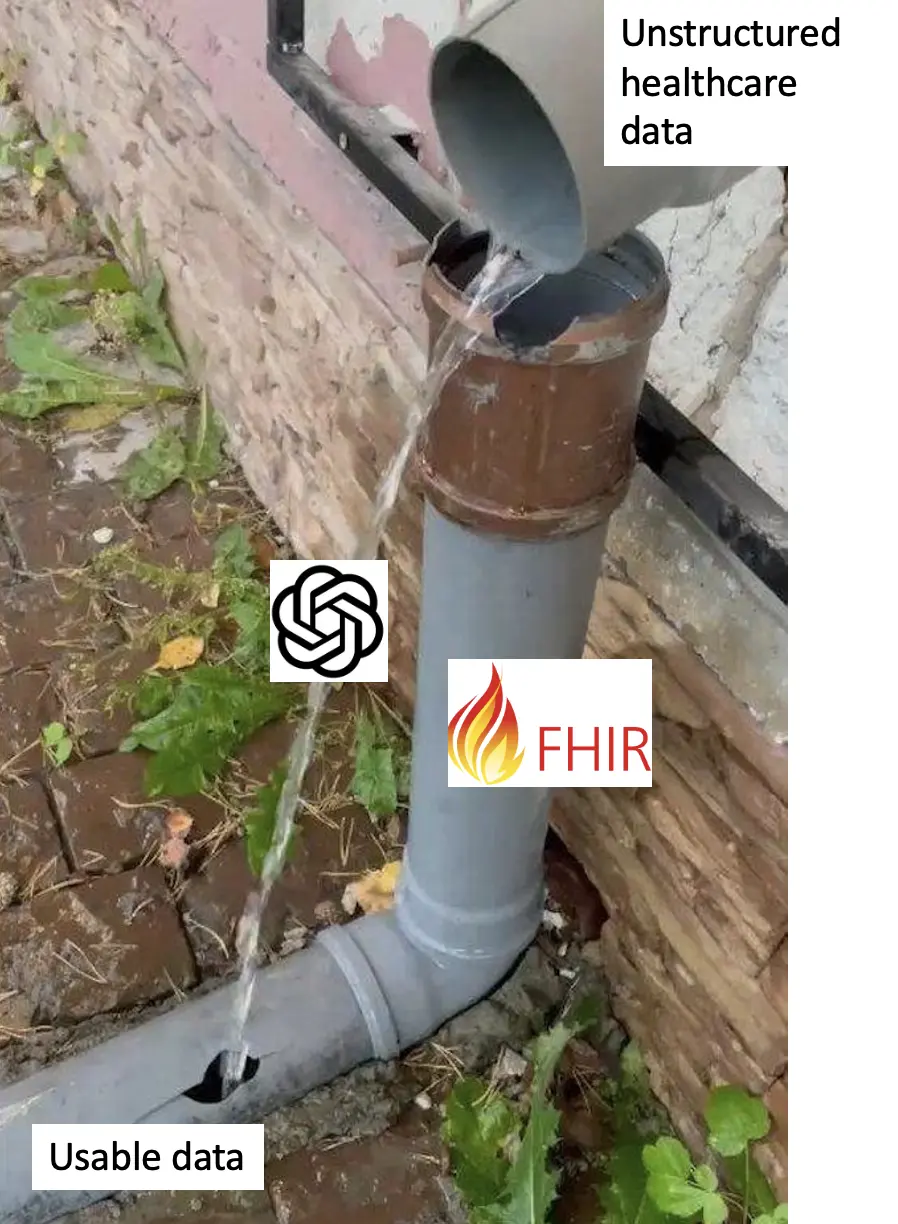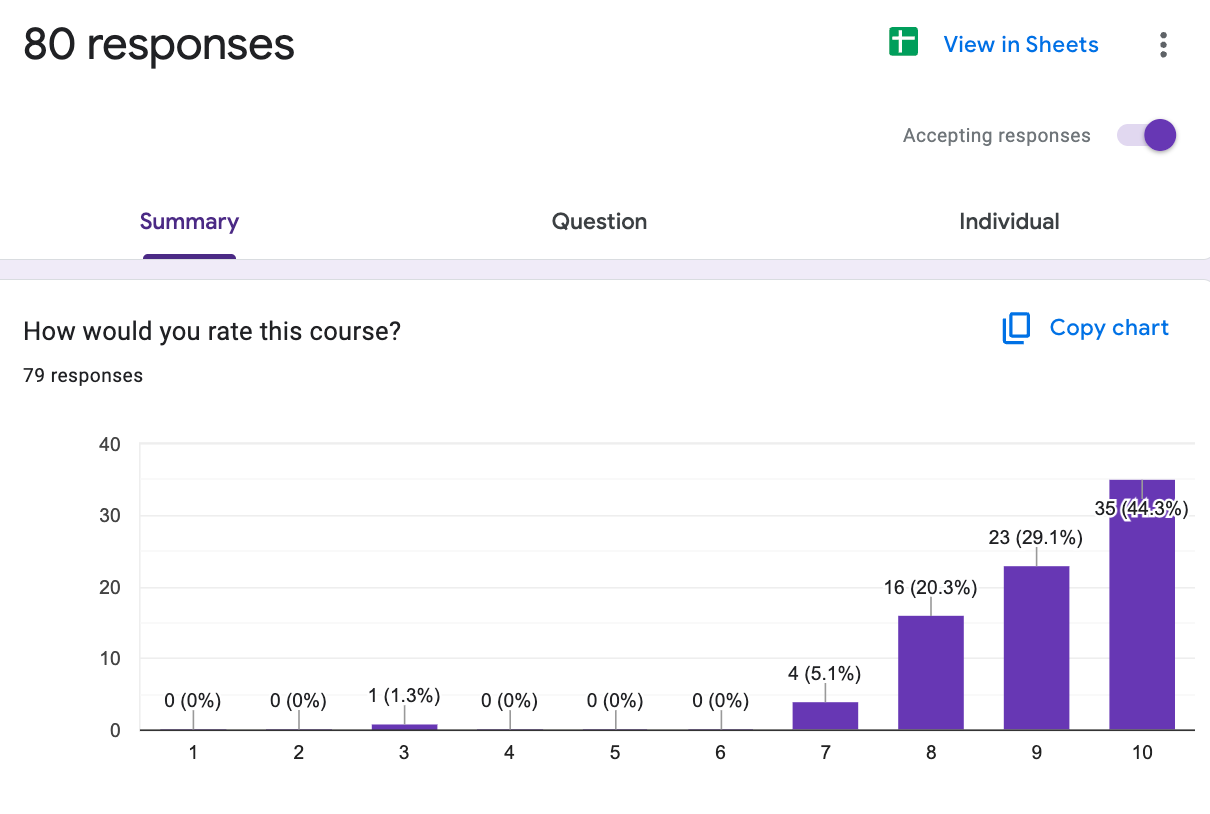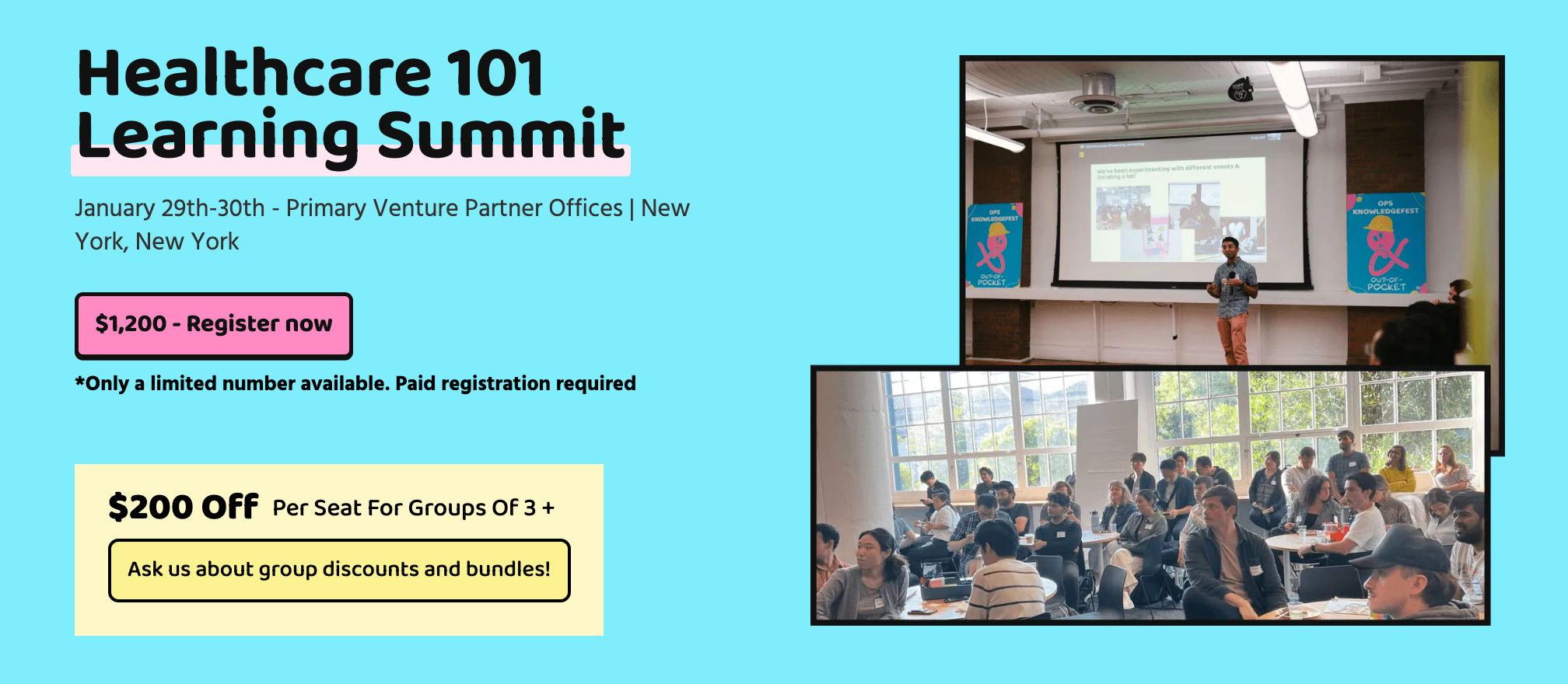But actually good 2024 predictions
Get Out-Of-Pocket in your email
Looking to hire the best talent in healthcare? Check out the OOP Talent Collective - where vetted candidates are looking for their next gig. Learn more here or check it out yourself.
 Hire from the Out-Of-Pocket talent collective
Hire from the Out-Of-Pocket talent collectiveIntro to Revenue Cycle Management: Fundamentals for Digital Health

Network Effects: Interoperability 101
.gif)
Featured Jobs
Finance Associate - Spark Advisors
- Spark Advisors helps seniors enroll in Medicare and understand their benefits by monitoring coverage, figuring out the right benefits, and deal with insurance issues. They're hiring a finance associate.
- firsthand is building technology and services to dramatically change the lives of those with serious mental illness who have fallen through the gaps in the safety net. They are hiring a data engineer to build first of its kind infrastructure to empower their peer-led care team.
- J2 Health brings together best in class data and purpose built software to enable healthcare organizations to optimize provider network performance. They're hiring a data scientist.
Looking for a job in health tech? Check out the other awesome healthcare jobs on the job board + give your preferences to get alerted to new postings.
I asked you all to send me your predictions for next year, and you didn’t disappoint.
New Sepsis Model Just Dropped
“New CMS financial incentives for sepsis, one of the most deadly and costly conditions facing hospitals, will create new winners and losers in the healthcare space. Companies that can roll out triage support will usher in a new era with a new standard of care. It will be possible to detect and treat sepsis faster than ever. This will have great impact on systems’ bottom line, resource allocation and ability to provide patients with better outcomes.”
-Ajay Shah, CEO and Co-founder Cytovale
[NK note: Maybe every AI company that chooses sepsis as a starting point finally has a business model to back it up. Each year 1.7M people develop sepsis and ~270K die despite it being pretty treatable if caught early. Feels promising!]

Quiet Quitting Comes To Healthcare
“A still-forming thesis I have is that we're going to see a bunch of second-order effects from the megatrend of the Millenial/Gen Z cohort becoming the median health care provider. Burnout/COVID accelerated this shift as older clinicians dropped away. Some early signs of this --
- The now hypercompetitive market for athleisure scrubs
- 10,000 now-annoying TikToks about GenZ doctors using slang to talk to their patients
- Epic Chat is by far the most commonly used communication tool in my hospital -- this is new since I started training in 2018. I cannot get my residents to pick up the phone (and I am not an old man)
.gif)
Where I think this is going to go in the next few years:
- The healthcare workforce will look like the broader millennial workforce -- no more committing to a company for 20 years, a lot more hopping around. This means that:
- We need better ways to interview/hire clinicians. This is still mostly a word-of-mouth, credential-driven process. We need better ways to feel out clinical fund-of-knowledge and cultural fit -- honestly, I think health care is going to go the way of consulting on this with standardized case-based interviews for the more competitive jobs
- Gig-ification of clinical jobs will continue, increasing focus of freedom + flexibility
- An increasing amount of white-labeled clinician workforces (Wheel, KeyCare, soon-to-be async) for novel care delivery models as health systems refocus on core competencies
- On the margin, clinical leadership at incumbents will have to get more "fun", especially as health system finances make it harder to compete on salary alone
- More physicians and midlevel provider groups will unionize”
-Rishi Khakhkhar, Medical Director of Virtual Urgent Care, Mount Sinai Health System
[NK note: The typical idea of Baumol’s cost disease is that more productive sectors can pay higher wages so they take talent from the less productive sectors. This then causes those less productive sectors to have to pay much more for labor themselves.
I have a corollary for today. More productive sectors have the money to curate better vibes, which then causes low vibe sectors to lose their employees EVEN IF THE PAY IS WORSE. I actually do think this is sorta critical for hospitals to figure out if they don’t want to lose young talent, and a pizza party probably isn’t it.]
Data Standards Rendered Obsolete?
“
- We won’t see accelerated adoption of interoperability standards (e.g., FHIR, HL7). The combination of evolving data lakehouse architectures and powerful generative AI unlock unprecedented value in loosely structured and unstructured data. Increasingly, machines are much less discriminating between a finely structured FHIR document and a poorly scanned PDF—and the latter may be richer than the former.

- We won’t see healthcare organizations pour more money into data science. Counterintuitively, the emergent capabilities of large language models will obviate the need for in-house data scientists to develop models. Instead, we’ll see investment in traditional analysts and application engineers who can build workflows around finely tuned public models available via friendly APIs.
- While we will certainly see a flurry of AI startups in healthcare, we won’t see any broad success in new foundational model development beyond the tech behemoths (e.g., Microsoft, Google, Amazon, and Meta). The scale and capital required to compete is just too great. What we will see is success for startups enabling companies to get the most out of models from the big players.”
-Nick Stepro, Chief Product Officer at Arcadia
[NK note: Maybe like my girlfriend, we actually don’t need standards to be happy.
It’s also possible you see data science/data analysts become outsourced managed services vs. departments within companies too. In fact maybe offering that outsourced service ends up being how these AI companies differentiate.]
Medicaid > Medicare Advantage + Guesses About New Drugs
“A few thoughts/predictions that I've been mulling over. Don't have explicit predictions .
- Medicaid starts to take over Medicare advantage as the most discussed item for big insurers. It's a bit vague so if I had to put a measurable to it: New slides added to the investor presentation will be about medicaid. A bigger prediction is that MA rates will be cut by >2%.
- On GLP1s: Cost effectiveness studies +increased coverage mean >5% of the adult population is prescribed a GLP1. Bold, yes. But I think this is an unstoppable force in the near term.
- CRISPRs Sickle cell treatment ends the year with <10 patients. The timeline to get new patients and book the revenue is so long that even with a 'cure', it takes time to ramp up.
- CMS wins the lawsuits for IRA and will beat down prices for the selected drugs for negotiation in 24.
Other thoughts: I think we continue to see a shift to APPs vs docs, Residents will continue to unionize, and big tech once again fails to deliver in tech."
[NK note: The number of Medicare Advantage (MA) enrollees is stagnating and risk adjustment methodology is becoming less lucrative so it makes sense that MA would slow down. Medicaid would be more interesting if states could come together and standardize more stuff - you’re seeing inkling of that with quality measures being standardized next year, but there needs to be way more.]
.gif)
It feels weird that this is both one of the best and worst times for the life sciences. GLP-1s and gene therapies actually seem to be working, while simultaneously the Inflation Reduction Act is trying to lower prices. It’s going to be a formative year for pharma, that’s for sure.]
MDMA gets an NDA, AND?
“Keep your (four) eyes on psychedelic-assisted therapy coverage and adoption, especially with todays announcement of NDA submission for MDMA assisted therapy by MAPS PBC. 3 decades of determination spearheaded by Rick Doblin, p impressive. You'll see similar dynamics for MDMA assisted therapy to GLP-1's: growing consumer demand for off-label use (FDA indication will be PTSD), payor push back for off-label use, supply chain issues (medication and trained therapists), carve-out employer point solutions (shameless plug for Meeko Health - website blows, workin on it) to help bundle medication, clinical experiential session, and ongoing integration.

Will be interesting to see if Mental Health Parity Requirements help in any way in the future, me thinks nope - because employers will point to on-label use as available. Also keep your eyes on Ketamine (que Wild Wild West, Will Smith) distribution. Generic, low price point, currently allowed to prescribe via telemed, and very consumer driven (will be interesting to see if further adoption of ketamine pulls away share from Spravato). Lets see how Ryan Haight restrictions unfold - gut check - it shouldn't be this easy to get ketamine mailed to my house....... that seems sus.
This all might be more of a 2025 thing, especially if MDMA assisted therapy gets approved late 2024”
-Amil Patel, Cofounder/CEO of Meeko Health
[NK note: Did I just get called four-eyes in the year of our lord 2023?
It’s been cool to see a lot of these recent drug breakthroughs that are a result of people who spent decades pushing orthogonal ideas of curing a disease, sometimes in spite of criticism. mRNA and Dr. Kariko, MDMA and Rick Doblin, and the brave souls that made fecal microbiota transplants a thing for IBS by doing stuff like...
“Falkow’s job was to prepare capsules of the patients’ stool for them to swallow after they’d been discharged, on the hunch that these would help to prevent postoperative infections. “I was all for it,” Falkow told me…
A hospital administrator discovered what was going on and, as Falkow recalls it, confronted him, saying, “Is it true that you’ve been feeding the patients shit?” Falkow was fired on the spot. - New Yorker
Thank god this worked out because there’s no way this guy would live that down. But sometimes you need weirdos and longshots to make breakthroughs.
Last year I predicted that there would be a ketamine crackdown but nothing really ended up happening. I wonder if the news of ketamine + buprenorphine in association with Matthew Perry’s death at home recently might reignite that conversation]
Thinkboi out,
Nikhil aka. "please just let me go on holiday now"
Twitter: @nikillinit
Other posts: outofpocket.health/posts
--
{{sub-form}}
If you’re enjoying the newsletter, do me a solid and shoot this over to a friend or healthcare slack channel and tell them to sign up. The line between unemployment and founder of a startup is traction and whether your parents believe you have a job.
INTERLUDE - FEW COURSES STARTING VERY SOON!!
See All Courses →A reminder that there’s a few courses STARTING VERY SOON!!
LLMs in healthcare (starts 9/8) - We break down the basics of Large Language Models like chatGPT, talk about what they can and can’t do in healthcare, and go through some real-world examples + prototyping exercises.
Healthcare 101 (starts 9/22) - I’ll teach you and your team how healthcare works. How everyone makes money, the big laws to know, trends affecting payers/pharma/etc.

We’ll do group rates, custom workshops, etc. - email sales@outofpocket.health and we’ll send you details.
INTERLUDE - FEW COURSES STARTING VERY SOON!!
See All Courses →A reminder that there’s a few courses STARTING VERY SOON!! And it’s the final run for all of them (except healthcare 101).
LLMs in healthcare (starts 9/8) - We break down the basics of Large Language Models like chatGPT, talk about what they can and can’t do in healthcare, and go through some real-world examples + prototyping exercises.
Healthcare 101 (starts 9/22) - I’ll teach you and your team how healthcare works. How everyone makes money, the big laws to know, trends affecting payers/pharma/etc.
How to contract with Payers (starts 9/22) - We’ll teach you how to get in-network with payers, how to negotiate your rates, figure out your market, etc.
We’ll do group rates, custom workshops, etc. - email sales@outofpocket.health and we’ll send you details.
INTERLUDE - FEW COURSES STARTING VERY SOON!!
See All Courses →A reminder that there’s a few courses STARTING VERY SOON!! And it’s the final run for all of them (except healthcare 101).
LLMs in healthcare (starts 9/8) - We break down the basics of Large Language Models like chatGPT, talk about what they can and can’t do in healthcare, and go through some real-world examples + prototyping exercises.
Healthcare 101 (starts 9/22) - I’ll teach you and your team how healthcare works. How everyone makes money, the big laws to know, trends affecting payers/pharma/etc.
How to contract with Payers (starts 9/22) - We’ll teach you how to get in-network with payers, how to negotiate your rates, figure out your market, etc.
Selling to Health Systems (starts 10/6) - Hopefully this post explained the perils of selling point solutions to hospitals. We’ll teach you how to sell to hospitals the right way.
EHR Data 101 (starts 10/14) - Hands on, practical introduction to working with data from electronic health record (EHR) systems, analyzing it, speaking caringly to it, etc.
We’ll do group rates, custom workshops, etc. - email sales@outofpocket.health and we’ll send you details.
INTERLUDE - FEW COURSES STARTING VERY SOON!!
See All Courses →Our Healthcare 101 Learning Summit is in NY 1/29 - 1/30. If you or your team needs to get up to speed on healthcare quickly, you should come to this. We'll teach you everything you need to know about the different players in healthcare, how they make money, rules they need to abide by, etc.
Sign up closes on 1/21!!!
We’ll do group rates, custom workshops, etc. - email sales@outofpocket.health and we’ll send you details.

Interlude - Our 3 Events + LLMs in healthcare
See All Courses →We have 3 events this fall.
Data Camp sponsorships are already sold out! We have room for a handful of sponsors for our B2B Hackathon & for our OPS Conference both of which already have a full house of attendees.
If you want to connect with a packed, engaged healthcare audience, email sales@outofpocket.health for more details.







